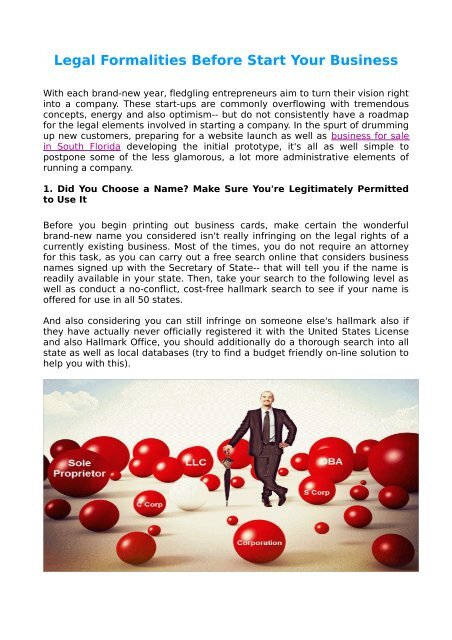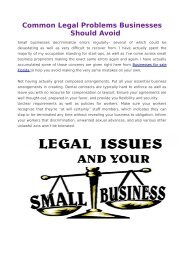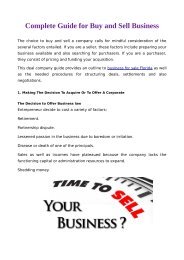Legal Formalities Before Start Your Business
You also want an ePaper? Increase the reach of your titles
YUMPU automatically turns print PDFs into web optimized ePapers that Google loves.
<strong>Legal</strong> <strong>Formalities</strong> <strong>Before</strong> <strong>Start</strong> <strong>Your</strong> <strong>Business</strong><br />
With each brand-new year, fledgling entrepreneurs aim to turn their vision right<br />
into a company. These start-ups are commonly overflowing with tremendous<br />
concepts, energy and also optimism-- but do not consistently have a roadmap<br />
for the legal elements involved in starting a company. In the spurt of drumming<br />
up new customers, preparing for a website launch as well as business for sale<br />
in South Florida developing the initial prototype, it's all as well simple to<br />
postpone some of the less glamorous, a lot more administrative elements of<br />
running a company.<br />
1. Did You Choose a Name? Make Sure You're Legitimately Permitted<br />
to Use It<br />
<strong>Before</strong> you begin printing out business cards, make certain the wonderful<br />
brand-new name you considered isn't really infringing on the legal rights of a<br />
currently existing business. Most of the times, you do not require an attorney<br />
for this task, as you can carry out a free search online that considers business<br />
names signed up with the Secretary of State-- that will tell you if the name is<br />
readily available in your state. Then, take your search to the following level as<br />
well as conduct a no-conflict, cost-free hallmark search to see if your name is<br />
offered for use in all 50 states.<br />
And also considering you can still infringe on someone else's hallmark also if<br />
they have actually never officially registered it with the United States License<br />
and also Hallmark Office, you should additionally do a thorough search into all<br />
state as well as local databases (try to find a budget friendly on-line solution to<br />
help you with this).
2. Register a Fictitious <strong>Business</strong> Name/DBA<br />
Ever before see those endless fictitious name announcements in the classifieds<br />
of your neighborhood paper? You could require one, as well. A DBA (Working<br />
As) should be submitted whenever your company does business under a<br />
different name. If you have actually obtained a single proprietorship or basic<br />
collaboration, a DBA is required if your firm name is different from your<br />
personal name. For an LLC or corporation, a DBA has to be submitted to<br />
perform business making use of a name that's different from the official<br />
Company or LLC name you filed. As an example, my firm is officially integrated<br />
as CorpNet, Inc., so we had to submit DBAs for the variants CorpNet.com and<br />
also CorpNet. These are generally submitted at the state and/or area degree.<br />
3. Include <strong>Your</strong> Company or Type an LLC<br />
Developing an LLC or corporation is a crucial action to protect your individual<br />
properties (such as your personal property or your kid's university fund) from<br />
any type of liabilities of the company. Each company framework has its own<br />
benefits and also drawbacks, depending on your specific conditions. 3 popular<br />
options are: the LLC (wonderful for small businesses that desire lawful defense,<br />
but very little formality), S Corporation (great for small businesses that could<br />
certify), or C Corporation (for companies that intend to seek financing from a<br />
VC or go public).<br />
As well as one other tip, Delaware and Nevada are two prominent states for<br />
business incorporation. Nevertheless, if your business has less compared to<br />
five investors, you're much better off developing an LLC in the state where you<br />
run your company (i.e. where you live).
4. Get a Federal Tax obligation ID Number<br />
To identify your business as a different lawful entity, you'll need to get a<br />
Federal Tax obligation Recognition Number, likewise described as an Employer<br />
Recognition Number (EIN). Released by the Internal Revenue Service, the tax<br />
obligation ID number corresponds to your individual social protection number<br />
and permits the IRS to track your firm's purchases. If you're a sole proprietor,<br />
you're not bound to obtain a Tax ID number, yet it's still good practice as you<br />
won't need to give your personal social security number for company concerns.<br />
5. Learn more about Employee Regulation<br />
<strong>Your</strong> legal commitments as a company start as quickly as you recruit your very<br />
first worker. You should spend time with a work law professional to totally<br />
comprehend your commitments for these (as well as various other) treatments:<br />
government and also state pay-roll and also withholding tax obligations, selfemployment<br />
tax obligations, anti-discrimination regulations, OSHA policies,<br />
joblessness insurance coverage, employees' compensation regulations, and<br />
wage and hr needs.<br />
6. Obtain the Necessary <strong>Business</strong> Permits and Licenses<br />
Depending upon your business kind as well as physical place, you could be<br />
called for to have one or more business licenses or permits from the state,<br />
neighborhood or perhaps government level. Such licenses consist of: a general<br />
business operation certificate, zoning and land use permits, sales tax<br />
certificate, wellness division allows, as well as job-related or specialist licenses.
7. Declare Trademark Protection<br />
You're not really needed by legislation to register a trademark. Utilizing a name<br />
immediately provides you common law legal rights as a proprietor, even<br />
without formal enrollment. Nevertheless, as anticipated, hallmark legislation is<br />
complex and just signing up a DBA in your state does not automatically give<br />
you common-law civil liberties. In order to claim initial use, the name has to be<br />
'trademarkable' and being used in business.<br />
Since you have actually spent unknown hours conceptualizing the excellent<br />
name, and you'll be putting a lot more effort into cultivating name<br />
acknowledgment, you should take into consideration registering your<br />
trademark for proper legal defense. Registering a hallmark makes it<br />
exponentially easier to recuperate your houses, like if someone takes place to<br />
use your service name as their Twitter manage. Having the right paperwork<br />
indicates you have the lawful right to that handle, as well as Twitter will<br />
certainly take steps to inflict you.<br />
8. Open a Bank Account to Beginning Structure Company Credit<br />
history<br />
When you count on your personal credit to money your business, your personal<br />
home mortgage, car lending as well as personal visa or mastercard all affect<br />
your ability to receive a company financing (and also for how much). Using<br />
company credit history divides your individual activities from that of the<br />
business. To start building your company credit history, you need to open a<br />
financial account in the name of your business, and the account must show a<br />
cash flow with the ability of handling a company financing.

















